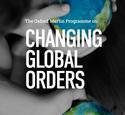The Dominance of Neoliberal Environmental Thought in Climate Change Politics
During a debate last October, Javier Milei, Argentina’s newly elected president, said: ‘policies that blame humans for climate change are false.’ This statement formed part of his broader critique of scientific methodology and evidence which demonstrates anthropogenic climate change. On another occasion, the Argentinian leader went even further by claiming that the climate crisis represents a ‘socialist lie,’ and condemned the Paris Climate Agreement as a manifestation of what he labelled as ‘cultural Marxism.’ Milei’s climate-change scepticism aligns with his reactionary rhetoric and broader assault on what he characterises as ‘woke culture,’ echoing a Donald Trump-esque populism. Similar to Trump’s reversal of the Obama-era climate policies, Milei seeks to roll back on Argentina’s climate agenda and prioritise the hyper-individualist creed of ‘life, liberty, and property’. The phenomenon begs the question: what ideological foundations precisely underpin these ideas of climate change scepticism reshaping Latin American politics?
Milei’s environmental rollback is largely intended to slash government regulation, epitomised by him literally wielding a chainsaw at public events. Since his inauguration in December 2023, Milei has promised to significantly reduce the size of his cabinet, and eliminating those departments that he does not consider a priority, such as the Ministry of Environment and Sustainable Development. In effect, this means shredding existing environmental infrastructure and regulation in Argentina, with potentially dramatic consequences for Latin America’s environment, if not the global order as such.
Underlying his direct attack on existing frameworks for environmental regulation is Milei’s conceptualisation of ‘free enterprise capitalism’ as ‘the only tool the world has to end hunger and poverty on the planet,’ as he claimed at the annual meeting of the World Economic Forum in Davos earlier this year. To be sure, Milei’s faith in free-market solutions goes beyond a mere response to Argentina’s economic crisis. It is more accurate to see his actions as a reflection of his deep ideological adherence to anarcho-capitalism, a political philosophy that advocates the abolition of the state and the establishment of a society based on voluntary interactions and strong private property rights.
In a recent revealing interview with The Economist, he discussed, with near theological conviction, his conversion from Keynesianism, which he adopted during his economic studies at various private universities and think tanks across Argentina, to anarcho-capitalism. During his studies and subsequent academic career spanning over 20 years, Milei slowly came to the realisation that, for him, Keynesianism did not adequately explain economic reality as he saw it. From his perspective, the 2008 financial crisis exemplified this problem, cementing his determination to seek explanations elsewhere. Upon reading the work of Austrian School economist Murray Rothbard, the architect of anarcho-capitalism, everything clicked into place. Milei came to view the state as a ‘criminal organisation,’ seeing the free market as the only mechanism that could help resolve structural issues. To him, this naturally also extended to the environmental realm. Just as the Austrian School had advocated robust property rights as the optimal solution for environmental concerns, Bertie Benegas Lynch, an Argentinian legislator belonging to Milei’s party, stated that ‘environmental problem can be solved with property rights (...) why don’t chickens and cows become extinct? Because they have an owner, because they are of economic use.’
This nexus between anarcho-capitalism and the environment will be explored in my forthcoming volume, Silent Defeat: How Neoliberals Won the Debate over the Environment, which has been co-edited with Troy Vettese, an environmental historian. Going beyond anarcho-capitalism, we analyse how other iterations of so-called free market thinking, grouped together under the term ‘neoliberalism,’ conceive of the environment. Drawing on the work of Melinda Cooper and Philipp Mirowski amongst others, we see neoliberalism as extending beyond mere advocacy for the free market and conceptualise the market as an information processor rather than solely a platform for exchange. Our volume explores how this logic came to dominate the environment policy realm, displacing scientists in its wake. Therefore, the neoliberal idea that effective environmental management, such as resource allocation and the pricing of externalities, could only be guided by market prices rather than by economists or planners, has taken hold in environmental politics.
While the connection between economics, especially economic growth, and environmental destruction has been well documented, the environmental repercussions of neoliberalism have been largely ignored. Though some important contributions such as The Value of a Whale and This Changes Everything have made the connection between neoliberal thought and the climate crisis, these texts lack a nuanced understanding of the intricacies of neoliberal thought and its historical roots. Ours is the first volume to do this, and we illuminate the complex and varied iterations of neoliberalism, demonstrating how its conceptions of the environment and proposed solutions to environmental issues have detrimental global effects.
The volume starts by setting out the formation and context of certain foundational neoliberal environmental ideas, such as cap-and-trade, privatisation and deregulation of environmental resources and iterations of techno-optimism. These vary from a genuine attempt to respond to the emerging demands of the green movement in the 1960s, through a neglect of the environmental question, to outright climate change denial. One contribution, written by Vettese, finds that John Dales, a well-connected neoliberal economist at the University of Toronto, was one of the first thinkers who came up with the well-known market-based environmental system of cap-and-trade in the late 1960s.
In this system a limit is set on the total amount of certain pollutants, and companies are given permits to emit a specific amount, which can be bought and sold among themselves on the market. This essentially neoliberal framework has been taken up by governments across the world, notably the European Union’s Emissions Trading System. Due to the excessive issuance of pollution permits which was the result of industry lobbying, the market price for permits was very cheap for the first few decades, so the scheme has had a minimal impact on the carbon emissions of EU member states. Emissions trading systems also harbour inherent flaws: rather than channelling money into the necessary alteration of energy infrastructure, it is instead diverted towards speculative financial instruments, resulting in bubbles, disruptions in capital flows, and the usual symptoms of financialisaton.
The chapter written by Lars Cornelissen on Deepak Lal, a prominent neoliberal development economist active from the 1990s onwards, offers a more sceptical approach to the pressing question of the environmental crisis. Lal argued against the prevalent view that global warming is primarily caused by human activity, asserting it as a non-anthropogenic phenomenon, an approach echoed by politicians à la Trump and Milei around the world. Lal became a key player in the network of neoliberal think tanks that established themselves as central platforms for promoting climate scepticism. For example, the Institute of Economic Affairs in the UK – whose publications Margaret Thatcher avidly consumed in the 1970s and 1980s – appointed Lal as a member of the Advisory Council of its newly established Environment Unit in 1993. While officially tasked with applying free-market analysis to environmental issues, the IEA's Environment Unit actually served as a platform for climate change scepticism.
Subsequently the volume analyses how neoliberal ideas, as conceived by the likes of Dale and Lal, actively influenced policy and regulation in the late twentieth century. One of our contributors, Erik Baker, for example explores how neoliberals in the 1970s and 80s successfully blamed post-industrial job loss on environmental regulation. The concept of 'job-killing regulation,' famously coined by US president Ronald Reagan in 1980, emerged as a potent weapon for neo-conservative politicians seeking to lure industrial workers away from the Democratic Party's coalition. By the time of Reagan’s second presidential campaign in 1984, the association between environmental regulation and unemployment had been gradually cemented, an association that temporarily eclipsed previous concerns about automation and international competition.
The final section of the volume explores techno-optimistic and anarcho-capitalist expressions of neoliberalism. Carla Ibled, for example, analyses how Silicon Valley libertarians, who represent a somewhat milder iteration of anarcho-capitalism and advocate for a very minimal role of the state, such as Peter Thiel and Elon Musk, have sought to commercialise space. They promote ideas of private enterprise in space exploration, securing property rights for resource extraction, fostering market competition among space companies, and lobbying for changes in government regulations to encourage investment and innovation in the space industry. These libertarians see space commercialisation as a way to bypass regulatory constraints, ‘address’ environmental challenges, and advance technological development. The contribution by Apolline Taillandier similarly explores a group of techno-libertarians who operated in the late 1980s and sought to overcome the Earth’s limitations by envisioning new spaces available for individual appropriation. This was to be achieved by applying a pure form of the free market system in realms they understood to lie beyond the reach of nation-state sovereignty such as cyberspace, international waters, and outer space. A current example of this line of thinking is Patri Friedman’s work, Milton Friedman’s grandson, who created the Seasteading Institute which seeks to create autonomous floating communities in international waters as a way to explore alternative forms of governance, environmental sustainability, and societal organisation.
Operating at the intersection between intellectual and political history, the goal of our volume is to explore why, and how, the ideas devised by this elite group of largely male and predominantly White neoliberal economists became popular in environmental politics globally, with critical consequences for the legitimacy of environmental science and the application of more effective environmental policies. Retaining an intellectual history focus allows us to clarify the genealogies of foundational concepts, such as cap-and-trade, and their dissemination through various political and intellectual networks. One of our key objectives is to represent neoliberal environmental thought in all of its eclecticism. Grasping this dynamism and the way in which these ideas became – and continue to be – influential allows readers to better recognise how neoliberal economics, rather than environmental science, have gained increasing traction in the realm of environmental policy. It should also compel us to devise new, alternative ideas and approaches to tackling environmental issues that lie outside of this neoliberal realm. If we remain trapped within this space, our cognitive dissonance will endure and we will continue hurtling along the path to environmental collapse.

Isabel Oakes is a DPhil student in the History Faculty at the University of Oxford looking at the intellectual roots of the ‘eco-social market economy’ in post-war Germany. She is currently based in Berlin where she is a visiting researcher at the SCRIPTS cluster of excellence at the Free University of Berlin. At the Oxford Martin School Programme on Changing Global Orders, she holds a position as a research assistant, specifically focusing on the History of Food Security and Political Economy. |




